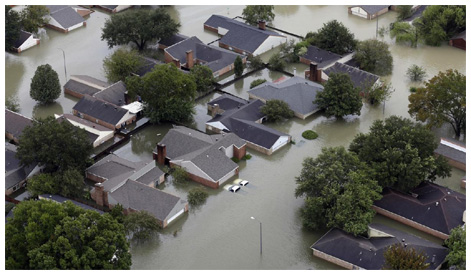 The following article originally appeared in the October newsletter to clients of FMI Corporation, for the purpose of providing the latest leading indicators and industry issues to those clients. Reprinted with permission.
The following article originally appeared in the October newsletter to clients of FMI Corporation, for the purpose of providing the latest leading indicators and industry issues to those clients. Reprinted with permission.
Houston has been in the headlines a lot after Hurricane Harvey came through our region and dumped up to nearly 52 inches of rain in some places. While a few outliers wrote about Houston’s no zoning “Wild West” expansion, the majority focused on the resilience of our city, the get ‘er done mentality that had strangers helping strangers, and the compassion of our neighbors who dropped everything to lend a hand. As the water recedes, the damage has become clear, and it is, remarkably, much less than expected. This storm’s damage was mostly located in our homes. Approximately 13,500 apartment units and 82,000 homes were damaged with another 63,000 homes affected but habitable without repairs. Approximately 300,000 cars were destroyed according to InfoNation, though the true number may never be known. This storm was different than Ike. The wind wasn’t as big of an issue, allowing power to stay on for most Houstonians. Lessons and improvements from past storms helped our community respond faster and avoid even greater damage or loss of life.
For the commercial community, current estimates have about 50 office buildings with damage—roughly 5% of the office square footage. Light industrial emerged relatively unscathed, as did our medical community, whose improvements after Allison were tested during Harvey. Retail was a bit more impacted, but the exact numbers aren’t really known since a lot of mom and pop shops that weren’t insured may not report and instead choose to fix them themselves. We expect to see those smaller businesses struggling and possibly some closures for those that didn’t have the cash flow to weather the days out of commission. However, if your store sells home supplies, home décor or clothes, then we suspect this storm will result in much higher sales for you for the remainder of the year as people replace lost items. K-12 schools had damage as well, ranging from minor damage to being closed for the year and students rerouted. Hotels, according to CBRE hotels, are reaping the benefits of the storm with occupancy rates and revenue per available room jumping up since the storm. If past storms are any indicator, they will continue to see this increased demand for about six months. Likewise, those homes which remained dry are now seeing higher demand, as are apartment units, whose rents have already begun to rise. The petrochemical community was also impacted, with Corpus Christi seeing the biggest hit. Baytown, while down temporarily, has seen all its refiners restart, with full capacity expected by the start of October.
For Houston contractors, it will be a temporary bump for a few months before leveling off, with the majority being renovation work and primarily on the residential side. We would expect to see labor and material cost escalations as the rebuild will exacerbate the worker shortage, and everyone will be looking for lumber, drywall, trucks and other renovation materials at the same time.
For our community, the long-term impact remains to be seen. With multiple large storms hitting Texas, Florida and Puerto Rico in such a short time period, we run the risk of donation fatigue – as people further inland stop contributing toward relief as these events become more common. Additionally, the recovery efforts in Florida and Puerto Rico will only further strain the workforce and materials costs while all these areas try to rebuild. Moody Analytics is projecting $97 billion in destruction from Harvey (across the entire path of destruction from the storm) and early estimates of $300 billion, when Hurricanes Irma and Maria are factored in. Dr. Bill Gilmer noted that storms are bad for a person’s balance sheet but good for the local economy and employment, and so we suspect that Houston’s resiliency will continue and that the lemonade we make from these lemons will be even sweeter.
If there are metrics or topics you would like FMI to include in upcoming newsletters, or if you would like to discuss any of the information contained herein in more detail, please contact FMI at 713-840-1775.
Photo courtesy of The Boston Globe
Houston’s Monthly Metrics: October 2017
by Candace Hernandez | October 03, 2017


